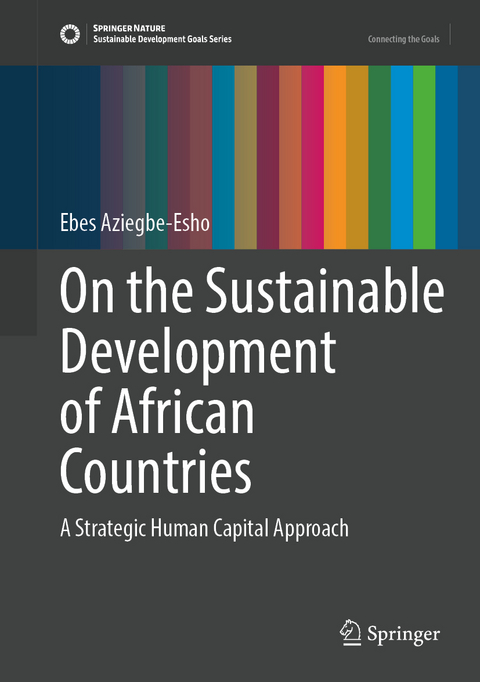
On the Sustainable Development of African Countries
Springer International Publishing (Verlag)
978-3-031-81123-4 (ISBN)
- Noch nicht erschienen - erscheint am 24.02.2025
- Versandkostenfrei
- Auch auf Rechnung
- Artikel merken
Despite Africa's vast and diverse natural resources, the developmental challenges plaguing the continent still remain. Indeed, a common factor that seems to bind all African countries together is developmental problems and challenges. From North Africa to Southern Africa, across West Africa through to Central and East Africa, African countries, especially those in Sub-Saharan Africa, are faced with the same or similar developmental challenges. Many reasons have been offered for Africa's developmental challenges. Amongst developmental economists, the reasons range from geographical, historical, cultural, and tribal factors, to institutional factors. The unfavourable geographical landscape, its colonial and other peculiar histories, the huge diversity in culture and tribe that seem to hinder efforts at unity, and lack of good governance and the institutions of quality governance, have all been given as reasons for the inability of the continent to make good developmental progress.
This book offers a strategic human capital approach as a pathway to the sustainable development of African countries. The book synthesizes different knowledge domains on human capital, and presents ways on how human capital can be strategically developed and accumulated by African countries for sustainable development. The book highlights how the continent's growing youthful population can be strategically harnessed into human capital for sustainable development. Unlike other books on human capital and Africa's development that rely on a single disciplinary perspective, usually from economics, this book takes a multi-disciplinary and inter-disciplinary approach. The book draws from theories and studies of human capital in economics, the originating discipline of the concept, strategic management, entrepreneurship, and Strategic Human Resources Management. Thus, it is able to present the discuss and recommendations from a holistic integration of the concept of human capital. The book also presents case studies of three countries, Singapore, Finland, and Canada, that have successfully made strategic use of human capital in their national development in different ways; another unique feature of the book. Lessons on national human capital development are drawn from each case study.
Another unique feature of the book is its integration of the various global human capital indices available for a comprehensive understanding of the indices, their components, and utility for countries. Finally, the book is replete with many generic and specific recommendations on how human capital can be developed by various stake holders in Africa. A whole chapter is dedicated to generic strategic approaches to human capital development that can be adopted by African countries; and indeed, by all countries as they can be applied by other countries. The generic approaches are cumulatively drawn from resource-based theory (RBT), transaction cost economics, and human capital theory. Another chapter is also dedicated to more specific recommendations on human capital development and accumulation.
Ebes Aziegbe-Esho is a Senior Research Associate of University of Johannesburg (UJ), South Africa, and completed her Phd in Management, specialising in business strategy, at Lagos Business School, Pan-Atlantic University, Nigeria (LBS-PAU). In 2016, her research paper on human capital won the best doctoral paper award at the Academy of International Business (AIB-SSA, now AIB-Africa) conference. With a focus on African context, her core research interests include exploring the creation of value from human capital resources, FDI, and dynamics and growth of African business. Ebes lectured in Covenant University, Nigeria, before becoming a resident postdoctoral research fellow at UJ for three years. She won a best reviewer award from the international management division of the Academy of Management (AOM) in 2020. Before academia, she worked in the banking industry, and also holds a bachelor's degree with honours in accountancy from University of Nigeria, Nsukka, an MBA and MPhil from LBS-PAU, and a certificate in statistical analysis from the University of St. Gallen, Switzerland. Her research has been published, and presented on global platforms such as AOM, Strategic Management Society, and Business History conferences. In addition to research, Ebes founded and manages Student Founders and Entrepreneurial Platform (SFEP) - an organization that supports students in business and entrepreneurship.
Chapter 1: A Strategic Human Capital Approach to the Sustainable Development of African Countries: Introduction.- Part 1: Human Capital: Laying the Foundation.- Chapter 2: What is Human Capital?.- Chapter 3: The Nature of Human Capital.- Chapter 4: Outcomes and Benefits of Human Capital.- Part 2: Case Studies of National Outcomes of Strategic Human Capital Development.- Chapter 5: Global Human Capital Indexes and Introduction to Part Two.- Chapter 6: The Emergence of Asia: The Case of Singapore.- Chapter 7: Integrated Europe: The Case of Finland.- Chapter 8: Immigration & Human Capital Accumulation in North America: The Case of Canada.- Part 3: Human Capital in African Countries.- Chapter 9: State of Africa's Human Capital and Introduction to Part 3.- Chapter 10: Generic Strategic Approaches to Human Capital Development and Accumulation.- Chapter 11: Developing Africa's Human Capital: Recommendations and Suggestions.- Chapter 12: A Strategic Human Capital Approach to the Sustainable Development of African Countries: Conclusion.
| Erscheint lt. Verlag | 13.5.2025 |
|---|---|
| Reihe/Serie | Sustainable Development Goals Series |
| Zusatzinfo | Approx. 240 p. |
| Verlagsort | Cham |
| Sprache | englisch |
| Maße | 178 x 254 mm |
| Themenwelt | Sozialwissenschaften ► Politik / Verwaltung ► Vergleichende Politikwissenschaften |
| Schlagworte | Global human capital indices • Human Capital • Human Capital Development • Strategic immigration • sustainable development |
| ISBN-10 | 3-031-81123-2 / 3031811232 |
| ISBN-13 | 978-3-031-81123-4 / 9783031811234 |
| Zustand | Neuware |
| Haben Sie eine Frage zum Produkt? |
aus dem Bereich


